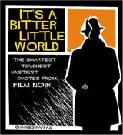|
|
||||
|
by Betty Jo Tucker  Film historian Charles Pappas loves "film noir," those cynical movies about sex, violence and money featuring losers who seek the very thing that gets them killed. In his fascinating book, It's a Bitter Little World: The Smartest, Toughest, Nastiest Quotes from Film Noir, Pappas highlights the terrific dialogue that makes these films so memorable. For example, from Out of the Past (1947): JEFF BAILEY (watching Kathy play roulette): That isn’t the way to play. KATHIE MOFFAT: Why not? JEFF BAILEY: ‘Cause it isn’t the way to win. KATHIE MOFFAT Is there a way to win? JEFF BAILEY There’s a way to lose more slowly. Included in this well-researched book are quotes from such classics as The Maltese Falcon, Double Indemnity, Touch of Evil, Gilda and The Big Sleep as well as from contemporary films like The Usual Suspects, The Last Seduction, Pulp Fiction and Using the words-as-weapons writing style characteristic of his subject, Pappas crafts a stylish Introduction worthy of the best film noir screenwriters. “In noir, the women have jewelers’ loupes for brains and cash registers for hearts; they stomp on the men, who are losers or loners,” he observes. “The words are the explosions. . . If, as Emerson said ‘language is poetry,’ film noir will now and forever be a skeletal record of monsters that bite worse than any T.rex.” Here are three of my favorite quotes included in It's a Bitter Little World: From “See, Mr. Gittes, most people never learn to face the fact that at the right time and the right place, they are capable of anything.” From Shadow of a Doubt (1943): “There’s one good thing about being a widow, isn’t there? You don’t have to ask your husband for money.” From Reservoir Dogs (1992): “You shoot me in a dream, you’d better wake up and apologize.” In his enlightening Introduction, Pappas also covers the origin and history of film noir. The term, meaning “black film” was coined by a French film critic in 1946 and referred to a type of movie with a dark, somber tone and pessimistic mood. It was derived from roman noire (“black novel”), a term French critics adopted to describe the British Gothic novel. Although first used in connection with films made from 1941 through 1958, the roots of film noir go back to American gangster movies, starting with Little Caesar in 1930. And films in this style certainly continued to be made after 1958. Pappas knows why. In a recent Film Threat interview, he explained, “As long as life disappoints, men and women betray each other, and what we need gets us killed, there'll always be film noir.” It’s a Bitter Little World is a wonderful resource book and makes a great gift for movie fans on your holiday shopping list. Click here to order copies from Amazon.com.
|
||
|
© 2026 - ReelTalk Movie Reviews Website designed by Dot Pitch Studios, LLC |




